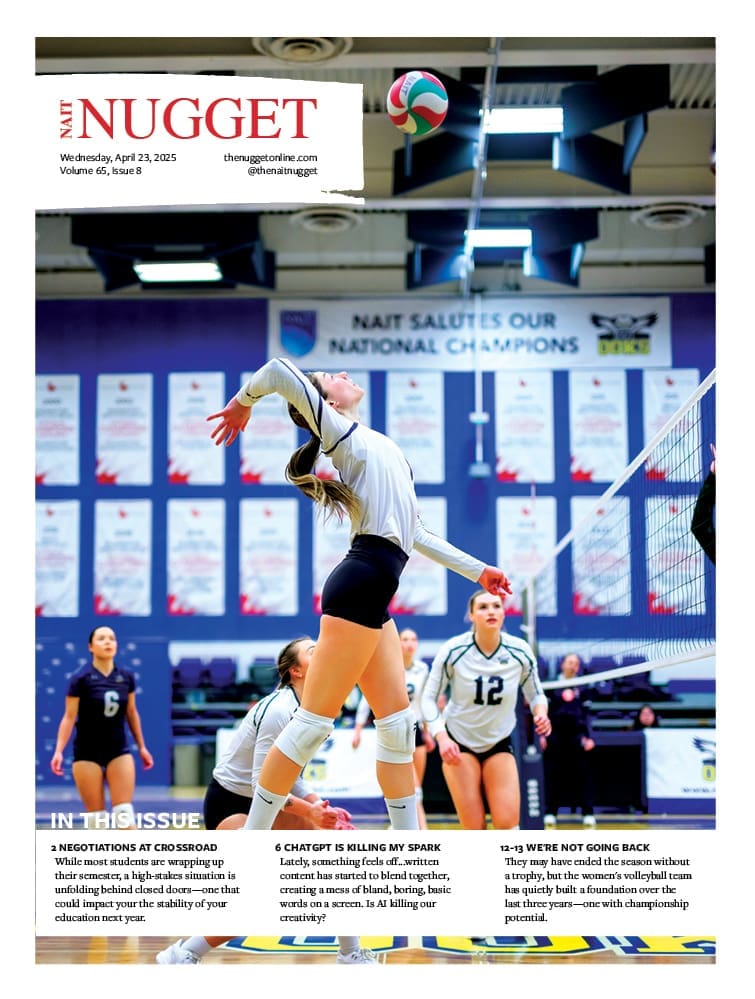NAIT has announced that in the 2023/24 academic year, students will be required to pay a new mandatory non-instructional fee (MNIF) for student technology. The fee, planned at $30 per semester for fall and winter terms, $15 for spring and summer terms and $2 per week for apprentices, will go towards crucial technology upgrades on campus. The fee comes along with an average 5.5 per cent increase in domestic tuition for the 2023/24 year.
MNIFs are fees that help offset the costs of goods and services students expect, such as the fitness centre, the OneAtNAIT and the UPass. “MNIFs are a key revenue source that we reinvest into student services, supports and technology that enhance the NAIT student experience and support student learning but are not covered by tuition,” said Peter LeClaire, NAIT VP Academic, in an email announcement. An emailed statement to the Nugget from NAIT adds, “The new mandatory non-instructional fee (MNIF) will help enhance several technical services that are outside of the classroom and lab spaces such as improving wi-fi in non-classroom settings and makerspaces and increasing the amount of loanable technology available to students.”
What it covers
Renata Medeiros, Academic Vice President of NAITSA, says the new student technology fee will help NAIT cover the costs of implementing and upgrading some technological infrastructure for students in and out of the classroom. Some changes include better Wi-fi, which Medeiros says students have complained about. “There are some blind spots around campus … we want students to be able to use it wherever they are,” said Medeiros.
The fee will also go towards purchasing new loanable computers which are near the end of their life cycles. “We want to make sure that students have good and reliable computers that they can take out,” explained Medeiros. Also to be upgraded is the ITS Student Help Desk. “We want to make sure that service is better and better each time. And if students have an IT issue, if they’re not able to log into their Moodle or any other thing, that the help desk group can help them,” she said.
NAIT and NAITSA Collaboration
According to the Post-Secondary Learning Act, NAITSA must approve all new MNIFs at NAIT. A spokesperson confirmed in an email that NAITSA approved the new MNIFs on March 6th after months of conversation, and their feedback was incorporated into the fee recommendation on March 7th. Medeiros says NAITSA and NAIT have been talking about introducing MNIFs since last November. She adds that they wanted to make sure that there was a compromise between cost and functionality. “[The fees] will be for the best interest of the students and it will be at a reasonable price. Because we know that tuition is higher and it’s just getting higher and higher. So, we don’t want to make this a barrier for our students.”
The VP Academic, however, is aware of the growing technological needs of students since coming back in person. “They sometimes don’t even have Wi-Fi at home, and they need somewhere to go and do their assignments or even watch the online classes, so they come here to campus. We have been hearing from [students] that the Wi-Fi is not good and sometimes when they are in class doing assignments or doing their class, the Wi-Fi just crashes.”
Medeiros continues by adding that they wanted to see the numbers before agreeing to the MNIF. ”We asked NAIT for every single detail on every data that they had so that we can make a very informed decision.” One of the agreements between NAIT and NAITSA to implement the new technology fee was the creation of a four-person committee. NAIT’s only legal obligation after an MNIF has been approved is to consult, which NAITSA was not comfortable with. “Their only legal requirement is to consult with us. We were not comfortable with that, approving this MNIF and only being consulted on where the money is going. We wanted to be able to have a say and make sure that the money goes where the students need it to go,” said Medeiros.
“With [the committee], we’ll be able to manage the money that will go into this MNIF, so it will be two people from NAIT as well as two NAITSA executives. And then we have to make sure that the money is going to where the students need [it] to go.”
Both NAIT and NAITSA agree the upgrades are necessary. “It was a very hard decision for us to make to approve this MNIF and we understand that with inflation and the high costs of just living, it’s getting worse, and tuition as well,” said Medeiros. “But NAIT is also getting their budget cut a lot from the government, and the projects that will come out of this MNIF, they are not going to be 100% funded by the students,” said Medeiros.
According to NAIT and NAITSA’s agreement, the MNIF will only cover a portion of the fees. For example, the MNIF will cover 5.6 per cent of the upgrades to the Student Help Desk, and 8.4 per cent of the Wi-Fi upgrade. The rest of the cost will be paid by NAIT.
What it will cost
The technology fee will amount to $30 for fall and winter terms, $15 for spring and summer students and two dollars a week for apprenticeship students.
NAIT is also increasing the amount for the existing athletics and recreation fee and the one at NAIT and U-pass support fee. Full-time fall and winter students will now pay $166.60 in MNIFs, including $130.27 in recreation and athletic fees, $6.33 in OneCard support and $30 for the new student technology fee. Spring and summer term fees will cost $18.17 ($15.00 for technology support fee and $3.17 for one at NAIT and U-Pass support fee), and apprentices will pay $11.22 per week ($8.69 for athletics and recreation fee, $2.00 for student technology fee and $0.53 for one at NAIT and U-Pass support fee.) The recreation and athletic fees cover fitness equipment loans, esports and active study spaces.
Feedback and Concerns
Renata Medeiros says she wants to hear from students, as it’s the main reason why the committee was formed. “So that the students have a voice on what their money is doing here in this institution.”NAIT also encouraged students to reach out to Student Services if these new fees may cause financial hardships. “Access and affordability are important to you, just as they are important to us. We will continue to provide resources for you to access financial aid and flexible payment options,” said LeClaire.
Cover photo via NAIT Content Collective






